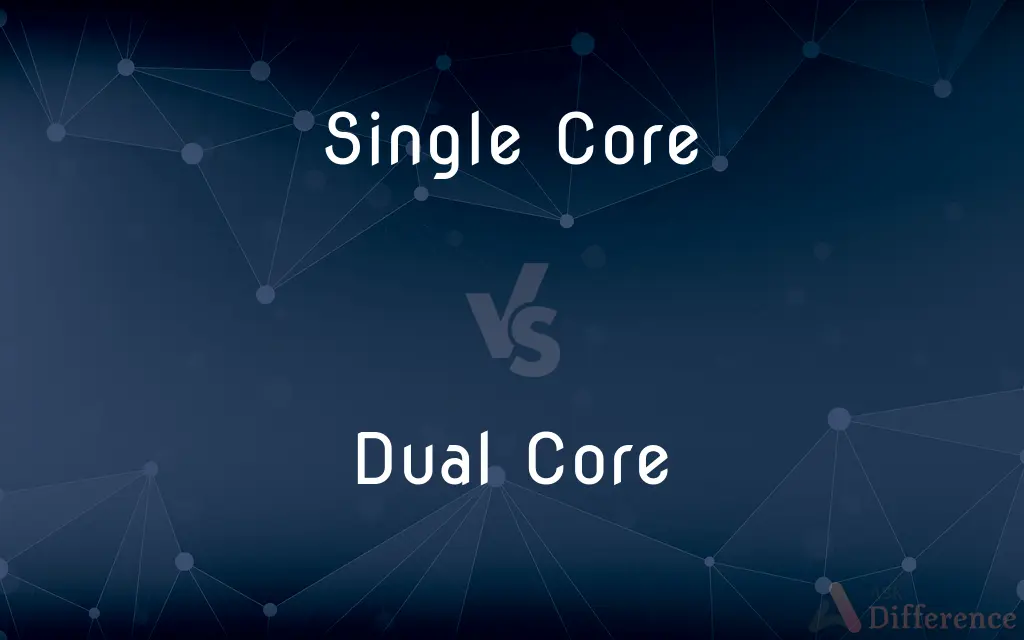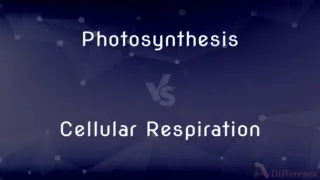Single Core vs. Dual Core — What's the Difference?
Edited by Tayyaba Rehman — By Fiza Rafique — Published on November 6, 2023
A Single Core processor has one computing unit, while a Dual Core processor has two. Dual Core processors can handle more tasks simultaneously. Both are central processing units but differ in multitasking efficiency.

Difference Between Single Core and Dual Core
Table of Contents
ADVERTISEMENT
Key Differences
Single Core processors have been the foundation of many computers for decades. Dual Core processors, however, represent a shift in the way processors are designed by integrating two cores into one chip. Each type offers distinct advantages and limitations, making them suitable for various applications.
A Single Core processor operates with just one core, handling one task at a time. This means if multiple tasks are present, the Single Core processor queues them, leading to potential slowdowns. Dual Core processors, on the other hand, can process two tasks simultaneously because of the presence of two individual cores, leading to faster and smoother multitasking.
In terms of performance, Single Core processors might lag behind their Dual Core counterparts, especially when running multiple applications. Dual Core processors split the workload between the two cores, allowing for efficient processing and reduced strain on each core.
The evolution from Single Core to Dual Core processors is akin to transitioning from a single lane to a dual-lane highway. While the single lane (Single Core) can accommodate traffic, the dual-lane (Dual Core) can handle more vehicles, thus reducing potential congestion.
Comparison Chart
Syllables
Two (Single-Core)
Two (Dual-Core)
ADVERTISEMENT
Word Count
Two
Two
Origin in Computing
Earlier generation
Later advancement
Task Processing
One at a time
Two simultaneously
Performance Efficiency
Generally lower
Generally higher
Compare with Definitions
Single Core
The foundation of many early computing systems.
The Single Core processor in my old device takes its time with demanding tasks.
Dual Core
A step towards harnessing multiple cores for optimized computing.
Switching from Single Core to Dual Core marked a noticeable difference in speed.
Single Core
A CPU that lacks the parallel processing capabilities of multi-core counterparts.
With a Single Core CPU, multitasking can sometimes become a challenge.
Dual Core
A CPU that can simultaneously run two instructions.
Dual Core CPUs provide a balance between performance and power consumption.
Single Core
A chip that handles one instruction at a time.
My vintage computer's Single Core processor struggles with modern software.
Dual Core
A chip designed for parallel processing of tasks.
Upgrading to a Dual Core CPU improved my computer's performance significantly.
Single Core
A processor with only one computational unit.
Older computers often relied on Single Core processors.
Dual Core
A processor that contains two computational cores.
My laptop's Dual Core processor handles multitasking with ease.
Single Core
The precursor to multi-core processing in computers.
Before the era of multi-tasking efficiency, Single Core processors dominated the market.
Dual Core
A leap in computational design for enhanced multitasking.
Dual Core processors became popular as users demanded better multitasking capabilities.
Common Curiosities
What is a Single Core processor?
A Single Core processor has only one computational core to execute tasks.
Is Dual Core better than Single Core?
Generally, Dual Core processors offer better multitasking and performance compared to Single Core.
How does a Dual Core processor differ?
A Dual Core processor contains two computational cores, enabling parallel processing.
Are there processors with more than two cores?
Yes, there are multi-core processors like quad-core, hexa-core, and octa-core, among others.
Are Single Core processors still used today?
While less common, Single Core processors are still found in some basic devices or older systems.
Does a Dual Core processor consume more power than a Single Core?
Not necessarily. Dual Core processors can be more power-efficient due to workload distribution.
Why did the industry shift from Single Core to Dual Core?
The shift was due to increasing demands for multitasking and better performance in computing.
Can a Single Core processor run modern software efficiently?
It depends on the software, but Single Core processors might struggle with demanding applications.
Was Dual Core the first multi-core processor?
Dual Core was among the first commercial multi-core processors, but advancements have led to processors with even more cores.
Do all modern computers use Dual Core or higher?
Most modern computers use multi-core processors, but the number of cores varies based on the device and its intended use.
Why might someone still use a Single Core processor?
Single Core processors might be adequate for basic tasks or be part of legacy systems.
Can I upgrade my Single Core computer to Dual Core?
It often requires a new motherboard and compatible components to upgrade from Single Core to Dual Core.
Can Single Core processors handle gaming?
Single Core processors might struggle with modern, demanding games but can handle older or less-intensive games.
Are Dual Core processors suitable for professional tasks like video editing?
While better than Single Core, for demanding professional tasks, quad-core or higher processors are often recommended.
Are all Dual Core processors of the same speed?
No, the speed of Dual Core processors can vary based on model, brand, and other factors.
Share Your Discovery

Previous Comparison
Sea Star vs. Starfish
Next Comparison
Photosynthesis vs. Cellular RespirationAuthor Spotlight
Written by
Fiza RafiqueFiza Rafique is a skilled content writer at AskDifference.com, where she meticulously refines and enhances written pieces. Drawing from her vast editorial expertise, Fiza ensures clarity, accuracy, and precision in every article. Passionate about language, she continually seeks to elevate the quality of content for readers worldwide.
Edited by
Tayyaba RehmanTayyaba Rehman is a distinguished writer, currently serving as a primary contributor to askdifference.com. As a researcher in semantics and etymology, Tayyaba's passion for the complexity of languages and their distinctions has found a perfect home on the platform. Tayyaba delves into the intricacies of language, distinguishing between commonly confused words and phrases, thereby providing clarity for readers worldwide.













































